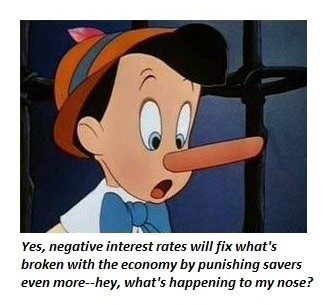Submitted by Charles Hugh-Smith via OfTwoMinds blog,
Dishonesty wasn't really a solution, it was simply easier.

Scale-invariant refers to a dynamic that functions equally well on the micro-level as it does on the macro-level. (The scientific definition is: "scale invariance is a feature of objects or laws that do not change if scales of length, energy, or other variables, are multiplied by a common factor.")
Accounting is scale-invariant. If a household has fewer assets than liabilities, it is insolvent. If a $10 billion company has fewer assets than liabilities, it is insolvent.
Human emotions also have scale-invariant features, as we all share the same wetware / genetic heritage / naturally selected default settings and capabilities.
The notion that the ideal solution to a problem is to hide it by ignoring it and refusing to discuss it is scale-invariant. "The elephant in the room" in a marriage is a problem that one or both partners fear might blow up the relationship, and neither is willing to take that risk.
In a corporation (for example, in Nokia before it collapsed), mid-level managers hide problems for fear of being fired or demoted.
In national governments and central banks, major financial/ economic problems are glossed over with soothing public relations and rigged statistics.
We all know this "solution" (hiding a problem and refusing to acknowledge it directly) eventually blows up the relationship, the corporation or the national economy.
Dishonesty wasn't really a solution, it was simply easier: directly acknowledging a serious problem is difficult for many reasons. Nobody likes to acknowledge failure and/or powerlessness, and nobody likes to sacrifice or ask others to sacrifice.
So we ignore the problem, gloss it over, mask it, and refuse to honestly confront the unwelcome realities.
Kyle Bass has consistently maintained that China's ballooning debt has reached the point that the government, despite its claims to the contrary, can no longer control the inevitable implosion of China's $3 trillion in corporate debt and trillions in other private-sector debt.
In comparing the asset-liability mismatch that triggered the collapse of the U.S. housing bubble in 2008 with China's current mismatch, Bass said:
"…our asset-liability mismatches were two and a half percent of our system, and you know what they did. So China's excesses (at 10% of their system) are already, they're already so far ahead of the world's excesses in prior crises that we're facing the largest macro imbalance in world history. And to this day, I can't figure out why people don't see it for what it is."
If we can't be honest, no solution is possible.
Many of us declared the official response to the Global Financial Meltdown of 2008-09 nothing but smoke and mirrors and extend and pretend.
Interestingly, after seven years of weak growth and rising wealth/income inequality, the mainstream media is finally discussing the reality that the official "fixes" of quantitative easing (QE) and zero-interest rate policy (ZIRP) have not been solutions at all: they've only exacerbated imbalances and inequalities that have grown in size and severity.
Putting off the day of reckoning is not a real solution. Solutions require honesty, and currently that honesty is too painful to bear.
So instead of getting an opportunity to think through a long-term solution, we'll get another meltdown (this time in China) and the authorities will choose politically expedient "extend and pretend" fixes that only make the underlying imbalances and instabilities worse.
Denial is not a solution, and neither is acting like the problem doesn't exist. But this is our short-term default setting in all scales of human life.
There is a high price to be paid for not solving problems, just as there is a great dividend for those few who have learned to tackle problems head-on in a brutally honest fashion.
The post If We Can’t Be Honest, No Solution Is Possible appeared first on crude-oil.top.
